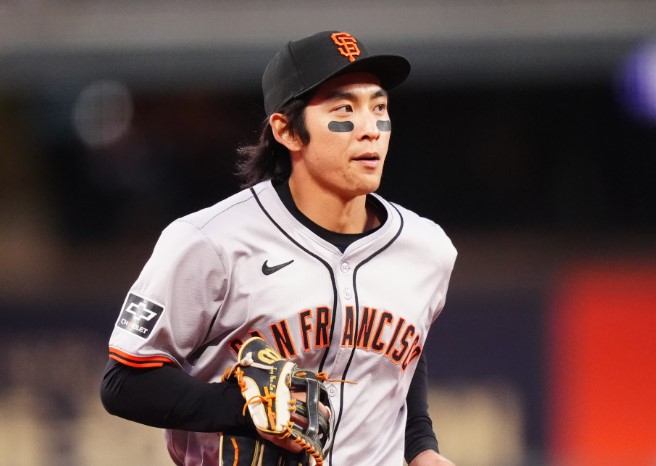Jung Hoo Lee’s Tears Reveal the New Heart of San Francisco
When Jung Hoo Lee stepped onto the field for the San Francisco Giants this season, many fans saw the highlight reels, the defensive plays in center field, and the precise bat control that made him a star in Korea. But what they didn’t see, until last night, was the weight of the homesickness he’s been carrying since leaving Seoul to chase his MLB dream.
During a scheduled post-game interview with ESPN after a gritty, rain-soaked win over the Padres, Lee was asked a seemingly simple question: “What’s been the hardest part of adjusting to MLB life?” There was a pause, a nervous smile, and then, to the shock of the ESPN crew, Lee’s voice cracked.
“I just… miss my family,” he managed, before lowering his head and letting the tears fall.
Within hours, a short clip of that moment hit TikTok, uploaded by a fan account. It quickly exploded, crossing two million views overnight as fans across the baseball world flooded the comments with hearts and messages of support in English and Korean. Many called Lee “the new heart of San Francisco,” echoing the raw humanity in that moment rarely seen in the highly curated, high-pressure environment of professional sports.
Lee’s arrival in San Francisco was more than just a baseball signing; it was a symbol of a new era for the Giants, a fresh start after seasons of transition. The 25-year-old outfielder, known for his discipline and humility, moved across the world to prove himself on the biggest stage. While his defensive skills and clutch hits have drawn attention, behind the scenes, teammates say Lee spends most of his time quietly studying film, adjusting to MLB pitching, and Facetiming his parents when the time difference allows.
“It’s the first time he’s been away from his family this long,” a Giants staff member shared anonymously. “He doesn’t show it, but you can see it in the little moments. He’ll watch videos from home, or just sit quietly before games. But when he steps on the field, he’s all in.”

The interview became a viral moment not because of the tears alone, but because of what they represented. For many immigrant players, the journey to MLB is a lonely one, filled with language barriers, cultural differences, and a relentless schedule that leaves little room for personal connection. Lee’s vulnerability cracked that surface, reminding fans that behind the jersey is a young man navigating a new life while carrying the expectations of a city and the hopes of a family thousands of miles away.
Giants fans, often known for their tough-love approach, have embraced Lee’s moment of vulnerability with compassion. At the next home game, fans were seen holding signs that read “We’re Your Family Here” and chanting his name as he stepped up to bat. One TikTok clip showed a young Korean-American fan holding a sign saying “Fighting, Lee!” with tears in her eyes, waving as Lee nodded in her direction before stepping into the box.
The Giants organization has leaned into this moment as well, sharing the clip on their official channels with a simple caption: “Proud to have you, Jung Hoo.” It was a rare moment of raw humanity in the machine of professional sports, a reminder that players are people, and sometimes the biggest strength is allowing yourself to be seen in your moments of weakness.
Lee has since acknowledged the moment on his Instagram, posting a photo of the San Francisco skyline with a short caption: “Thank you for understanding.” The post is filled with comments from both American and Korean fans, sharing stories of homesickness, courage, and love for the game.
In a season filled with stats, standings, and constant debates about trades and lineups, Jung Hoo Lee’s tears were a reminder that baseball, at its core, is about people. It’s about the moments that connect fans to players, the stories that go beyond the scoreboard, and the simple, universal truth that even heroes miss home.
As the Giants push forward in their season, Lee’s story has become a rallying point for a fanbase looking for hope and connection. It’s clear that while his bat and glove brought him to San Francisco, it’s his heart that’s making him a Giant.